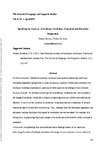| dc.contributor.author | Perales-Escudero, Moises Damian | |
| dc.date.accessioned | 2024-03-13T15:38:54Z |
| dc.date.available | 2024-03-13T15:38:54Z |
| dc.date.issued | 2012-04-04 |
| dc.identifier.issn | 1305-578X |
| dc.identifier.uri | http://hdl.handle.net/20.500.12249/4113 |
| dc.description.abstract | Planteamiento del problema: Los modelos de uso del vocabulario académico deben abordar perspectivas lingüísticas discursivas y funcionales para mejorar la validez y autenticidad del constructo en la evaluación del vocabulario académico, particularmente con respecto a la prueba de familias de palabras.
Propósito del estudio: Proporcionar una imagen más clara del uso del vocabulario académico que pueda informar el diseño de pruebas de vocabulario académico al mejorar la validez y autenticidad del constructo.
Método: Se ha realizado un estudio de la literatura sobre vocabulario académico para presentar varias perspectivas y sus deficiencias. Luego, se discuten los hallazgos de las tradiciones de lingüística funcional y análisis del discurso con respecto al uso del vocabulario. Se presenta un ejemplo de un elemento de prueba que incorpora perspectivas funcionales sobre el uso de derivados dentro de un lema.
Conclusión: La incorporación de hallazgos funcionales y discursivos relacionados con las funciones estructuradoras del discurso de múltiples derivadas de un solo lema puede conducir a prácticas de enseñanza y evaluación del vocabulario más auténticas y válidas. |
| dc.description.provenance | Submitted by Moisés Damián Perales-Escudero (mdperales@uqroo.edu.mx) on 2024-03-06T17:58:56Z
No. of bitstreams: 1
perales.2012.texto.pdf: 300553 bytes, checksum: 7c975e8fdc5b6b5c36677dd102428ba5 (MD5) |
| dc.description.provenance | Approved for entry into archive by Yeni Martin Cahum (yenimartin@uqroo.edu.mx) on 2024-03-13T15:38:54Z (GMT) No. of bitstreams: 1
perales.2012.texto.pdf: 300553 bytes, checksum: 7c975e8fdc5b6b5c36677dd102428ba5 (MD5) |
| dc.description.provenance | Made available in DSpace on 2024-03-13T15:38:54Z (GMT). No. of bitstreams: 1
perales.2012.texto.pdf: 300553 bytes, checksum: 7c975e8fdc5b6b5c36677dd102428ba5 (MD5)
Previous issue date: 2012-04-04 |
| dc.format | pdf |
| dc.language.iso | eng |
| dc.publisher | Arif Saricoban |
| dc.relation.ispartof | The Journal of Language and Linguistic Studies. |
| dc.rights.uri | http://creativecommons.org/licenses/by-nc-nd/4.0 |
| dc.subject | Lingüística aplicada |
| dc.subject | Lenguaje y lenguas -- Estudio y enseñanza |
| dc.subject | Adquisición de segunda lengua |
| dc.subject | Educación superior -- América Latina |
| dc.subject.classification | HUMANIDADES Y CIENCIAS DE LA CONDUCTA::LINGÜÍSTICA::LINGÜÍSTICA APLICADA |
| dc.title | Specifying the Construct of Academic Vocabulary: functional and Discursive Perspectives. |
| dc.type | Artículo |
| dc.type.conacyt | article |
| dc.rights.acces | openAccess |
| dc.identificator | 4||57||5701 |
| dc.description.other | Problem Statement: Models of academic vocabulary use need to address discursive and functional linguistics perspectives in order to enhance construct validity and authenticity in academic vocabulary assessment, particularly with regard to the testing of word families.
Purpose of Study: To provide a clearer picture of academic vocabulary use that can inform the design of academic vocabulary testing by enhancing construct validity and authenticity.
Method: A survey of the literature on academic vocabulary has been conducted to present various perspectives and their shortcoming. Then, findings from the functional linguistics and discourse analysis traditions with regard to vocabulary use are discussed. An example of a testing item incorporating functional perspectives on the use of derivatives within a lemma is presented.
Conclusion: Incorporating functional and discursive findings related to the discourse-structuring functions of multiple derivatives of a single lemma may lead to more valid and authentic academic vocabulary tests and teaching practices. |





